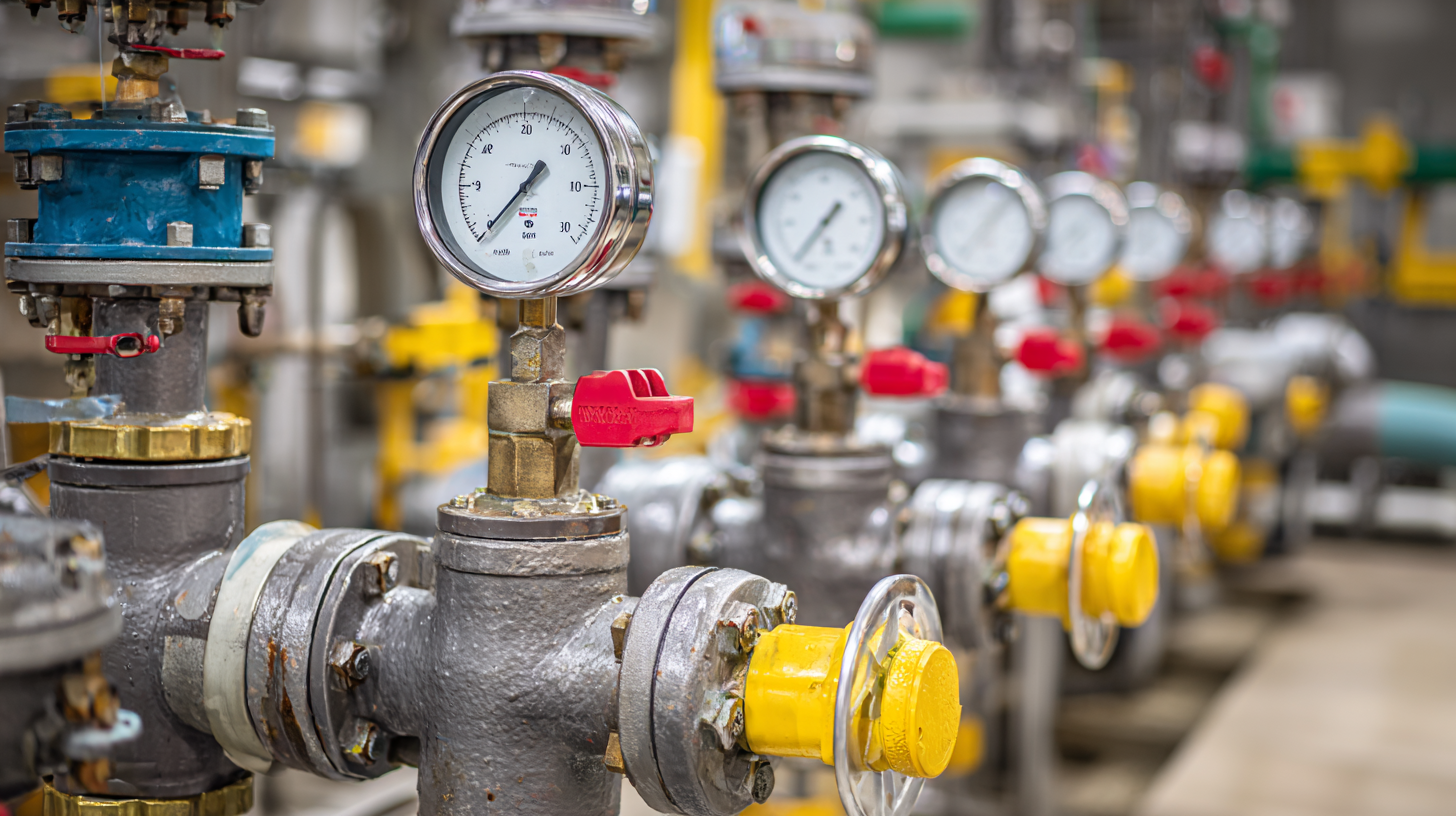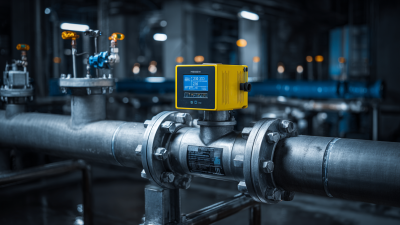9 Proven Reasons Why Mechanical Flow Meters Are the Best Choice for Accurate Measurements
In the ever-evolving landscape of industrial measurement, selecting the right flow meter is crucial for ensuring operational accuracy and efficiency. Among various options, the Mechanical Flow Meter has emerged as a leading choice, owing to its reliability and precision in quantifying fluid movement. According to a report by MarketsandMarkets, the global flow meter market is expected to reach USD 8.73 billion by 2025, driven by the demand for improved measurement techniques across diverse sectors.

Mechanical Flow Meters, leveraging mechanical displacement or rotation, offer high accuracy, minimal maintenance, and cost-effectiveness compared to electronic alternatives. This article explores nine compelling reasons why Mechanical Flow Meters stand out as the optimum solution for businesses seeking accurate and dependable measurements in their operations.
Advantages of Mechanical Flow Meters Over Electronic Options in Industrial Applications
In the realm of industrial applications, mechanical flow meters continue to stand out for their reliability and accuracy. Unlike electronic options, which can be susceptible to environmental factors such as temperature fluctuations and electromagnetic interference, mechanical flow meters operate without dependence on electricity. According to a report by the International Society of Automation, mechanical flow meters maintain precise measurements with an accuracy of ±1% of reading, even under harsh conditions. This is particularly advantageous in sectors like oil and gas, where maintaining flow integrity is critical to operational efficiency.
Moreover, maintenance and longevity are key advantages of mechanical flow meters. The same report indicates that mechanical meters typically have a lifespan of over 15 years when properly maintained. In contrast, electronic flow meters may require more frequent calibration and servicing due to their complex components. The inherent simplicity of mechanical systems allows for straightforward installation and minimal downtime, thereby reducing overall operational costs. As industries continue to seek out reliable measurement tools, mechanical flow meters emerge as a robust choice for ensuring accurate flow readings across diverse applications.
Key Factors for Achieving High Accuracy with Mechanical Flow Meters
When it comes to achieving high accuracy in measurements, mechanical flow meters stand out as a reliable choice in various industrial applications. One key factor contributing to their accuracy is the design of the meter itself. Mechanical flow meters typically employ rotating elements, such as gears or impellers, that respond directly to the flow of the liquid. This direct interaction enhances their sensitivity to flow changes, allowing for precise measurements even at low flow rates.
Another crucial element for maintaining high accuracy is proper installation and calibration. To ensure optimal performance, mechanical flow meters need to be installed in straight lengths of pipe, free from turbulence or obstructions. Regular calibration against known standards is also vital, as it helps to account for any wear or variations in the system over time. By focusing on these key factors, users can maximize the effectiveness of mechanical flow meters and rely on them for consistent and accurate flow measurements across a range of applications.
9 Proven Reasons Why Mechanical Flow Meters Are the Best Choice for Accurate Measurements - Key Factors for Achieving High Accuracy with Mechanical Flow Meters
| Reason | Description | Accuracy (%) | Typical Applications |
|---|---|---|---|
| High Precision | Mechanical flow meters provide high precision in measurement due to their design and functionality. | ±0.5% - ±1% | Water, Oil, Chemicals |
| Durability | Built to withstand harsh environmental conditions, ensuring reliable performance over time. | ±1% | Industrial Automation |
| Low Maintenance | Mechanical meters require less maintenance compared to electronic alternatives, which reduces downtime. | ±1% - ±2% | Agricultural Irrigation |
| Cost-Effectiveness | Lower initial investment and operating costs compared to other types of flow meters. | ±1% - ±2% | HVAC Systems |
| Versatile Measurement Capability | Capable of measuring a wide range of fluids, including viscous and non-viscous liquids. | ±0.5% - ±3% | Chemical Processing |
| Easy Installation | Simple installation procedures eliminate the need for complex setups. | ±1% | Water Treatment |
| Robust Mechanical Design | Mechanical designs offer durability and resistance to wear and tear. | ±1% - ±2% | Mining Operations |
| Wide Operating Range | These meters can operate efficiently across a range of flow rates and pressures. | ±0.5% - ±3% | Oil & Gas |
| Simplicity of Operation | User-friendly operation makes it accessible even for non-technical personnel. | ±1% | Food & Beverage Processing |
Impact of Temperature and Pressure Variations on Mechanical Flow Meter Precision
 Temperature and pressure variations can significantly affect the precision of mechanical flow meters. These devices rely on the physical movement of components to measure fluid flow, meaning that any changes in the environment can influence their performance. For example, increases in temperature can lead to thermal expansion of meter components, potentially skewing measurements. Similarly, variations in pressure can affect fluid density and viscosity, further complicating accuracy. It’s crucial for operators to regularly calibrate and maintain these meters, especially when working under fluctuating environmental conditions.
Temperature and pressure variations can significantly affect the precision of mechanical flow meters. These devices rely on the physical movement of components to measure fluid flow, meaning that any changes in the environment can influence their performance. For example, increases in temperature can lead to thermal expansion of meter components, potentially skewing measurements. Similarly, variations in pressure can affect fluid density and viscosity, further complicating accuracy. It’s crucial for operators to regularly calibrate and maintain these meters, especially when working under fluctuating environmental conditions.
Tip: To mitigate the impact of temperature and pressure changes, consider using a temperature compensation system in conjunction with your mechanical flow meter. This setup helps ensure that fluctuations in temperature do not lead to erroneous readings.
Additionally, using flow straighteners upstream of the meter can help maintain a consistent flow profile, which is vital for accurate measurements. Proper installation is key; even minor misalignments can exacerbate the effects of temperature and pressure variations. Regular monitoring and routine checks on both environmental conditions and the flow meter's performance can greatly enhance measurement accuracy.
Tip: Implementing a routine maintenance schedule can help identify potential issues before they lead to significant measurement errors, ensuring optimal performance of your mechanical flow meters.
Recent Industry Data Supporting the Reliability of Mechanical Flow Meters
Recent industry data underscores the reliability of mechanical flow meters, asserting their critical role in achieving accurate measurements across various applications. According to a review on smart water technology for efficient resource management, these devices excel in precision and durability, which are paramount for effective fluid dynamic analysis. As industries increasingly prioritize efficiency, the global test and measurement equipment market is projected to expand from USD 34.11 billion in 2024 to USD 43.95 billion by 2030, reflecting the rising demand for reliable measurement solutions.
In the domain of fluid measurement, mechanical flow meters have proven to be indispensable. Research highlights the necessity for precise liquid flow sensors, particularly in optimizing industrial processes. A recent study indicates that advancements in measurement technology, including ISO17089-1 compliance, have further enhanced the capabilities of ultrasonic meters, ensuring even greater accuracy in flow measurements.
**Tip:** When selecting a flow meter, consider the specific needs of your application—such as fluid type and flow rates—to ensure optimal performance and accuracy.
**Tip:** Regular calibration and maintenance of your mechanical flow meters can significantly enhance their longevity and reliability, leading to better overall operational efficiency.

Comparative Cost Analysis: Mechanical Flow Meters vs. Other Measurement Technologies
When evaluating flow measurement technologies, a comparative cost analysis reveals that mechanical flow meters present a compelling option for businesses seeking both precision and affordability. According to a report by the Flow Measurement Group, mechanical flow meters typically have lower initial purchase costs compared to electronic alternatives, making them suitable for budget-conscious operations. The lifetime maintenance costs for mechanical meters are also less daunting, given their robust construction and fewer electronic components that require regular calibration or replacement.
Tip: When considering a flow meter for your application, factor in the total cost of ownership—not just the upfront price. Mechanical flow meters often require less frequent maintenance, which can result in significant savings over time.
In addition, data from the American Society of Mechanical Engineers (ASME) indicates that mechanical meters can achieve accuracies of ±1% under standard operating conditions, rivalling many high-end electronic meters in precision. This makes them an excellent choice for industries where accuracy is critical while still keeping costs manageable.
Tip: If you're working in a volatile environment, ensure that your mechanical flow meter is appropriately rated for temperature and pressure since this can affect both performance and longevity.
Related Posts
-

How to Select the Best Turbine Meter for Your Industrial Needs
-

The Ultimate Guide to Understanding Flow Meters and Their Impact on Industrial Efficiency
-

Innovative Alternatives to Inline Flow Meter Solutions for Enhanced Measurement Accuracy
-

10 Best Chemical Flow Meters That Improve Accuracy by 95 Percent
-

7 Essential Flow Meter Types Every Industry Should Know
-

7 Best Flow Meter Types for Accurate Measurement in 2023
